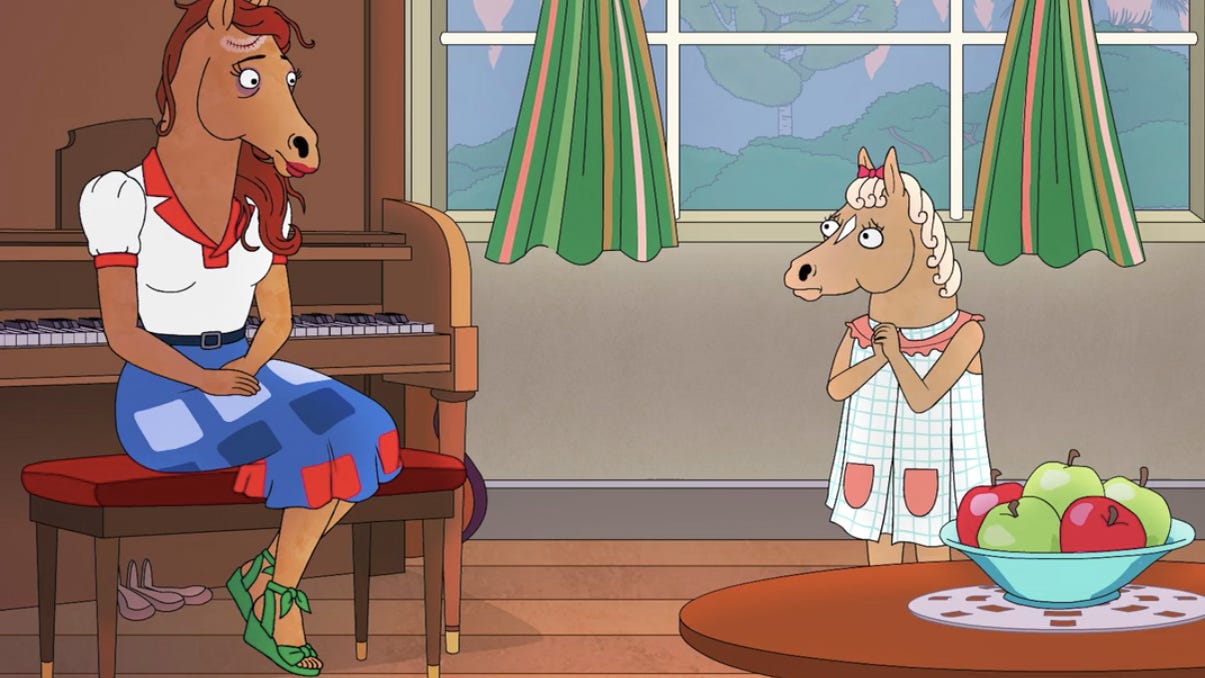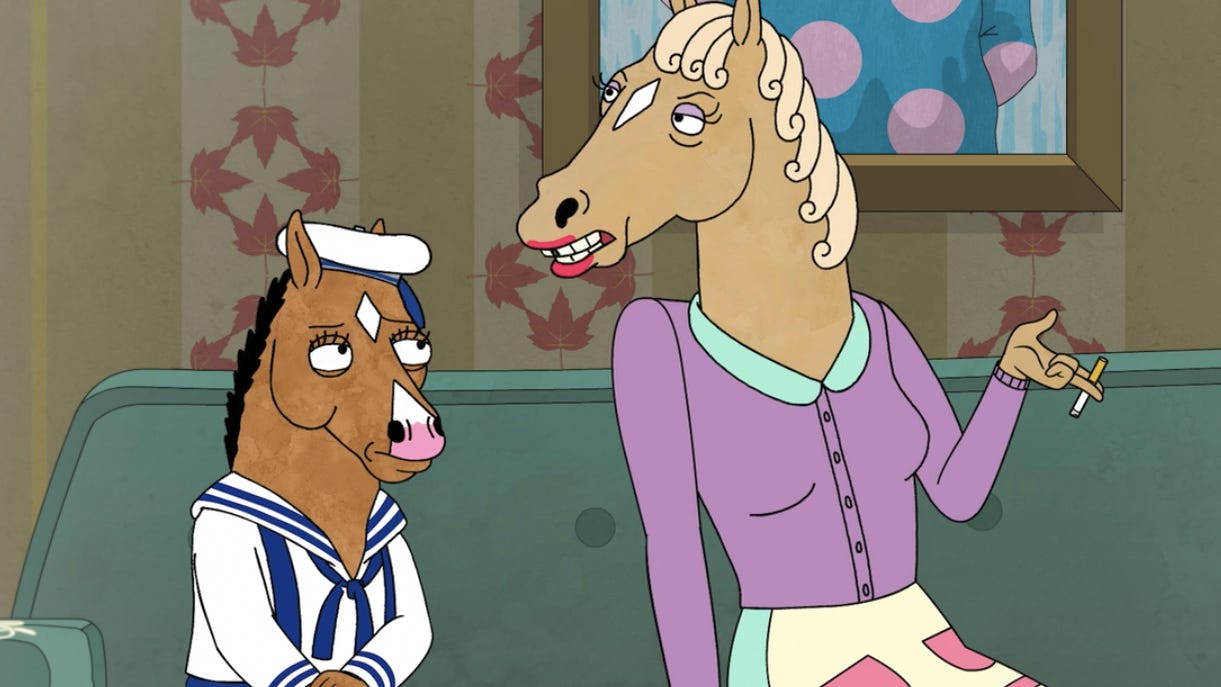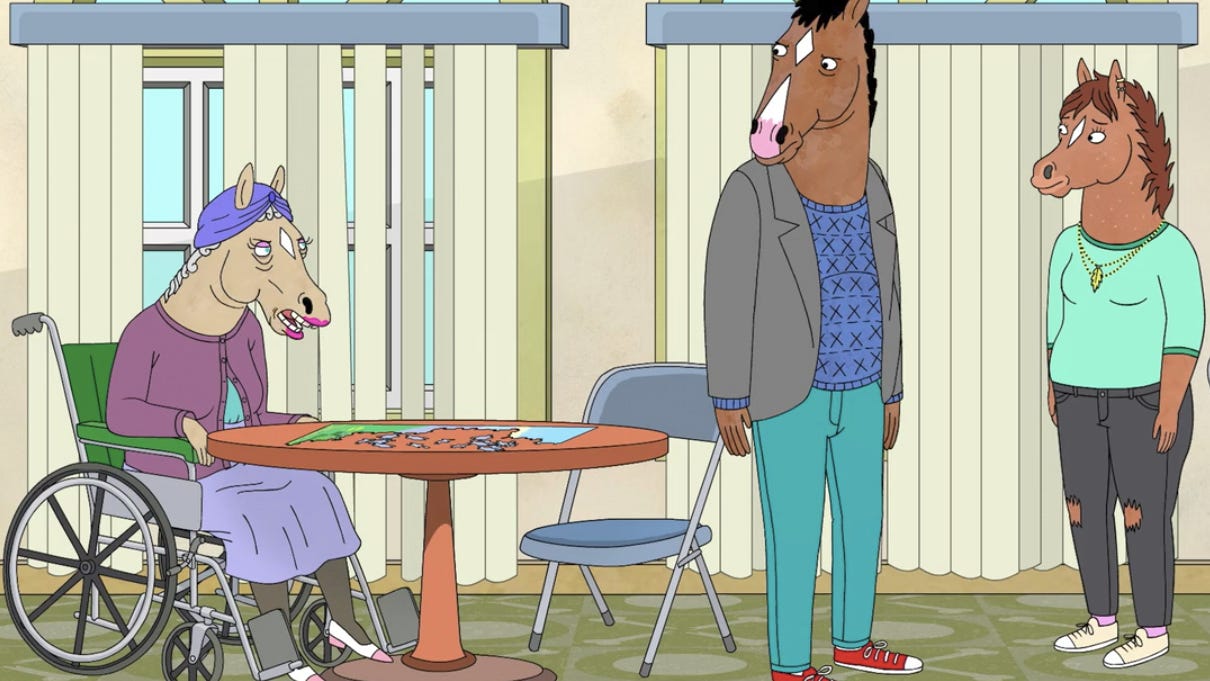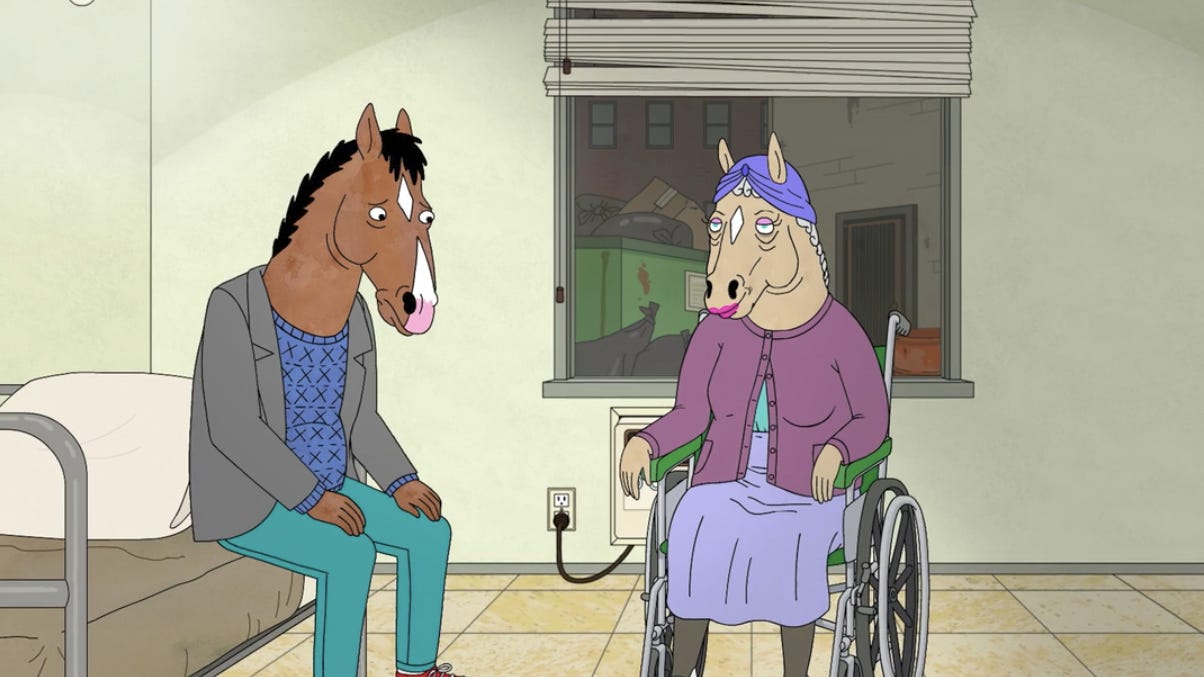Join or Sign In
Sign in to customize your TV listings
By joining TV Guide, you agree to our Terms of Use and acknowledge the data practices in our Privacy Policy.
BoJack Horseman's Fourth Season Explores Inherited Trauma -- and Changes Everything
Creator Raphael Bob-Waksberg discusses the season's big moves
[Warning: This article contains spoilers about Season 4 of Netflix's BoJack Horseman. Read at your own risk!]
"Everyone is the star of their own story."
According to BoJack Horsemancreator Raphael Bob-Waksberg, that's the defining principle in the writers room of Netflix's dark (like, really dark) comedy, whose fourth season premiered last Friday (Sept. 8).
More than ever before, the show embodies that concept in Season 4, which reunites BoJack (voiced by Will Arnett) with his elderly mother Beatrice (voiced, at all ages, by Wendie Malick) and is largely built around flashbacks to various points in Beatrice's life -- from her upbringing as a young girl in the 1940s to her teenage years, life as a young woman, and subsequent experiences as a wife and reluctant mother.
When Bob-Waksberg and the rest of the creative team got together ahead of the season, they decided to embrace the challenge of turning Beatrice into a sympathetic character.
See What Else Is Coming to Netflix in September
For starters, we learn in Episode 2 that Beatrice's mother Honey (voiced by Jane Krakowski) had a lobotomy at her husband's insistence, to deal with her "hysteria" after their son Crackerjack was killed in World War II. Beatrice, a young girl at the time, is at one point forced to drive a manic Honey home, and is instructed by her mother post-lobotomy: "Beatrice, promise me you'll never love anyone as much as I loved Crackerjack."

Those flashbacks occur while present-day BoJack has taken up residence in his grandparents' former house in Michigan, which served as the Horseman family summer house when he was a child. He spends a year there, avoiding the ghosts of his ancestors and eventually restoring the property with the help of a kindly dragonfly neighbor named Eddie (voiced by Colman Domingo).
In later flashbacks, we see Beatrice at her debutante ball, and then as a cruel mother to a teenage BoJack, telling him he'll never succeed at football (or any other endeavor he'd choose to pursue, for that matter). In present-day, she doesn't even recognize her son, even though she finds solace in watching reruns of Horsin' Around, the sitcom BoJack starred on.
Through Beatrice's story, BoJack Horseman explores the idea of "inherited trauma" -- a more academic way of saying an entire family, rather than just individual members, is cursed by bad luck.
"You can say a lot about characters by seeing where they're from," Bob-Waksberg notes. "Part of it is, whether [trauma] is truly inherited through genes, in the way that I think Transparent argued when they investigated it, or if it's more about seeing the influence and seeing how that affects generations. Seeing how Beatrice is, as an adult, still harboring things that she got as a child from her parents, and... seeing BoJack parrot back dialogue that his grandfather said to his mother when she was a kid."

Though BoJack tells Eddie at one point that he's the last of the family line ("Once my mother dies and I die, that'll be it... which is probably for the best"), viewers discover at the end of the season that that's actually not true -- although not in the way we initially thought. After spending the bulk of the season trying to track down her mother, BoJack learns that Hollyhock (Aparna Nancherla), the young girl who shows up this season on his doorstep claiming to be his long-lost daughter, is actually his sister.
The reveal comes in the most poignant sequence between BoJack and Beatrice, which occurs as he's preparing to dump his mother at an elder care facility after realizing she's been sneaking weight-loss supplements into his alleged daughter's coffee (more on that in a bit). Beatrice, in her addled state, has repeated flashbacks to various stages of her life as BoJack's driving her to the facility. We see her getting bullied as a young girl, dealing with a bout of scarlet fever that results in her having to put her "baby" (a doll) into a fire; witnessing her father's physical and verbal abuse of her mother; and falling in love with BoJack's father Butterscotch (also voiced by Arnett) after he crashes her debutante ball to score free alcohol on his way to California to join some beat poets. Their ensuing one-night stand results in Beatrice becoming pregnant with BoJack.
The socially-conscious Beatrice we see at her debutante ball, who disarms Butterscotch with her sarcasm and unwillingness to be impressed by his pontificating about Allen Ginsberg & Co., is nothing like the Beatrice we've come to know in BoJack's flashbacks. It's heartbreaking to look back on the early days of their relationship, as she and Butterscotch optimistically decide to move to California together and start their family. But soon the stresses of domestic life catch up with them, and both of them settle into a life they never envisioned for themselves -- Beatrice as a stay-at-home mom and Butterscotch as a blue-collar worker who abandons his dream of being a novelist. They begin to resent each other and, even more acutely, their son.
Hollyhock, we see, is the result of an affair a middle-aged Butterscotch had with the maid (the "Henrietta" a senile present-day Beatrice keeps addressing), and was given up for adoption after being born. In the flashback, Beatrice tells Henrietta they'll pay for her tuition in nursing school if she agrees to give her horse baby up for adoption. "Don't throw away your dreams for this child. Don't let that man poison your life the way he did mine," a tearful Beatrice says. "Believe me, you don't want this. ... Don't do what I did."

The twist that Hollyhock is not BoJack's daughter, but rather his sibling means that he now has a (literally) kindred spirit with whom to commiserate about his familial trauma; not to mention the depressive tendencies (and dislike of honeydew) they both share, without feeling the same sense of responsibility that he would as a father figure. "I never needed you to be a dad," says Hollyhock, who was adopted by a polyamorous collective of eight gay men. "But I've never had a brother."
Bob-Waksberg admits the writers were unsure about where to go with Hollyhock's storyline when they introduced her at the end of Season 3.
"The assumption was that she was probably his daughter... but in talking about it, we thought, oh, well, what if we did this other thing? How does that change the dynamic?" he says. "We wanted to do it in a way that didn't completely upset the apple cart. If we had found out at the end of the season that she was not related to him at all and she was just a random stranger, I think that would have undone too much in a way, or it would have made for a different story. So the idea that they still share this familial bond, it kind of changes it without undercutting it."
BoJack's inability to be a good "father" to Hollyhock initially softens his feelings towards his own mother, as he comes to the realization that "being a parent is impossible." But it's his sense of protection towards her that makes Beatrice's drugging Hollyhock the final straw that compels him to banish her to the facility.
"We play a lot this season with him viewing Hollyhock as an extension of himself," Bob-Waksberg says. "Because he hates himself so much, he finds it hard to love her. When he allows himself to love her it kind of allows himself to love himself a little bit."
In the present-day, as BoJack starts to leave Beatrice in a dank room that looks more like a jail cell, she finally recognizes him and calls him by name. Like she's flipped a switch in him, BoJack experiences a change of heart towards his mother, and for the first time adopts an air of kindness towards her. When she becomes confused about her new surroundings, he assures her she's at their lake house in Michigan, and paints a verbal portrait of it for her to give her comfort.

"People can interpret that as they see fit, why he is choosing to make that move with his mother," Bob-Waksberg hedges. "But we thought that was an important move. Maybe it wasn't necessarily even about her or for her as much as it was for himself to let go of this anger. ... Because he hasn't seen what we have seen in that episode, but he sees vulnerability."
And so, Season 4 of BoJack ends on a rare hopeful note, with BoJack embracing his new role as a big brother to Hollyhock and reaching, if not exactly a happily-ever-after ending with his mother, at least a tacit understanding.
"A big thing for BoJack this season, especially in relation to his mother, is the idea of forgiveness," Bob-Waksberg says. "When can you forgive? And when you are forgiving, who is that really for? We see all this anger he has towards her, and how it's festered and it's poisoned so much about him. It continues to build to the end of the season, really, because she continues to screw him over. And then, in the last episode they share together, he chooses to -- forgive might be too strong a word. But he chooses to treat her with grace."
Seasons 1-4 of BoJack Horseman are available to stream on Netflix.
